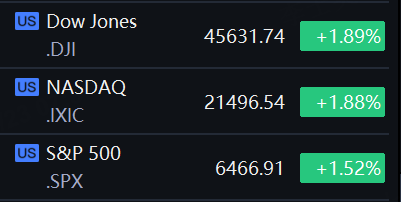Post-Bell | Dow Notches Record High; Alphabet Gains 3%; Tesla and Intel Jump 6%; Opendoor Soars 39%

Wall Street's main indexes ended higher on Friday, with the blue-chip Dow hitting a record closing high, as investors piled into stocks after U.S. Federal Reserve Chair Jerome Powell hinted at a near-term interest-rate cut during his Jackson Hole Symposium speech.
Market Snapshot
The Dow Jones Industrial Average rose 846.24 points, or 1.89%, to 45,631.74, surpassing its most recent record close on December 4, 2024. The S&P 500 gained 96.74 points, or 1.52%, to 6,466.91 and the Nasdaq Composite gained 396.22 points, or 1.88%, to 21,496.54.

Market Movers
Tesla - Tesla stock jumped 6.2% Friday, along with most of the market, after Fed chair Jerome Powell spoke in Jackson Hole, Wyo. The “Cyberbeast” version of the Cybertruck is getting more expensive. It’s another sign of how Tesla feels about the future of the EV and car businesses.
Intel - US President Donald Trump sealed a deal that give the US government a nearly 10% stake in Intel Corp., part of an unconventional bid to reinvigorate the beleaguered company and boost domestic chip manufacturing. Intel shares jumped 5.5%.
Alphabet, Apple- Alphabet stock jumped 3.2% on Friday after a report said Apple is exploring using Google’s Gemini to run the highly anticipated Siri voice assistant. Apple shares gained 1.3%.
Nvidia - Shares of Nvidia, the leading maker of AI chips, rose 1.7%. Multiple reports said thecompany had asked some of its suppliers to stop production related to its H20 processors, which are made for the Chinese market. The stock has finished lower for three consecutive days, falling 3.9% over the span, and has closed down in four of the past five sessions.
Palantir - Palantir Technologies gained 1.6% after the company, which sells AI software to manage and analyze large amounts of data, rose slightly Thursday to snap a six-session losing streak. It was Palantir’s longest losing streak since April 2024, when it also declined for six consecutive trading days, according to Dow Jones Market Data.
Zoom - Zoom reported second-quarter adjusted earnings of $1.53 a share, beating analysts’ forecasts of $1.38, as revenue rose 4.7% to a slightly better-than-expected $1.22 billion. The videoconferencing platform also raised its fiscal-year outlook, sending the stock up 12.7%.
Opendoor, Builders FirstSource, Trex, Mohawk - Builders FirstSource jumped 8.4%, Trex rose 5.5%, and Mohawk Industries rose 7.3% as investors in the homebuilding sector hoped Powell’s hint that rate cuts could be coming would lead to a reduction in mortgage rates. The shares of residential real estate platform Opendoor soared 39.2%.
Intuit - Intuit topped Wall Street’s fiscal fourth-quarter earnings expectations but the stock fell 5% following disappointing fiscal 2026 guidance. The parent company of TurboTax and Credit Karma said it expectsfiscal-year earningsof between $22.98 and $23.18 a share on revenue of $21 billion to $21.19 billion. The low end of Intuit’s guidance was just below Wall Street estimates for earnings of $23.02 a share on revenue of $21.1 billion.
Workday - Workday reported second-quarter adjusted earnings of $2.21 a share, beating analysts’ estimates of $2.11, as subscription revenue jumped 14% from a year earlier to $2.17 billion. But the stock stumbled, falling 2.8%, as the human-resources software company issued third-quarter guidance that was slightly shy of expectations. For the current quarter ending in October, Workday expects subscription revenue of $2.235 billion, just below estimates of $2.237 billion. Workday also announced it was acquiringParadox, a company that uses artificial intelligence to automate recruitment and hiring processes. Terms of the deal weren’t disclosed.
Ross - Second-quarter sales at Ross Stores rose 5% to $5.53 billion, with the discount department store chain saying it was encouraged by trends at the end of the quarter, “particularly with the early sales performance related to the back-to-school selling season.” Wall Street was estimating sales of $5.54 billion. Earnings of $1.56 a share included a negative impact of 11 cents from tariff-related costs, the retailer said. A year earlier, Ross Stores reported a profit of $1.59 a share. The stock was up 1.1%.
BJ's Wholesale Club - BJ’s Wholesale Club said second-quarter total revenue rose 3.4% to $5.38 billion but that missed analysts’ estimates of $5.49 billion. Comparable-club sales, excluding gasoline, rose 2.3% from a year earlier but were shy of estimates of 3.2%. BJ’s raised its fiscal-year adjusted earnings guidance range but maintained its outlook for comparable-club sales growth at 2% to 3.5%. The stock fell 8.5%.
Ubiquiti - Ubiquiti, the network-infrastructure company, raised its quarterly dividend to 80 cents a share from 60 cents, its board approved a new, $500 million stock buyback, and it reported fiscal fourth-quarter profit and revenue that rose from a year earlier. The stock jumped 30.6%.
Market News
Powell Says Fed May Need to Cut Rates, Will Proceed Carefully
Federal Reserve Chair Jerome Powell on Friday signaled a possible interest rate cut at the U.S. central bank's meeting next month, saying that risks to the job market were rising but also noting inflation remained a threat and that a decision wasn't set in stone.
While his comments were not as explicit as those previewing rate cuts following last year's Jackson Hole conference, investors quickly bumped up bets that the Fed will reduce its policy rate by a quarter of a percentage point at its September 16-17 meeting.
Several Wall Street analysts alerted clients they were tearing up prior forecasts for the Fed to wait until December to cut rates and now expected reductions totaling half a percentage point by the end of the year, from the current 4.25%-4.50% range.
Trump Announces Furniture Imports Probe, Setting Up Tariffs
President Donald Trump said the US is conducting a “major Tariff Investigation on Furniture coming into the United States,” setting the stage for industry-specific levies.
“Within the next 50 days, that Investigation will be completed, and Furniture coming from other Countries into the United States will be Tariffed at a Rate yet to be determined,” Trump said in a social-media post on Friday, claiming the move would revitalize domestic furniture makers in the US.
Trump did not specify how the investigation was being carried out, including if it was being done by the US Commerce Department under Section 232 of the Trade Expansion Act, which allows for the imposition of tariffs on goods deemed critical to national security. Under that law, the Commerce Secretary would be expected to deliver the results of any probe within 270 days.
US Takes Nearly 10% Intel Stake, Clinching Unorthodox Deal
US President Donald Trump sealed a deal that give the US government a nearly 10% stake in Intel Corp., part of an unconventional bid to reinvigorate the beleaguered company and boost domestic chip manufacturing.
Under the agreement, the US will receive 433.3 million shares of common stock — representing 9.9% of the fully diluted common shares in Intel — according to a statement from the company. The $8.9 billion investment will be funded by grants from the US Chips and Science Act and Secure Enclave program that had previously been extended but not yet paid, Intel said, confirming a report by Bloomberg News.
Together with the $2.2 billion in Chips Act money that Intel already received, the investment totaled $11.1 billion. The shares are nonvoting, and there is no board seat for the US government.







